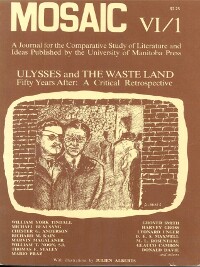Issue 6.1
Overview

Special Issue: Ulysses and the Waste Land: Fifty Years After
Published: October 1972
See the issue summary and contents below.
17 essays, totalling 256 pages
$15.00 CAD
Fifty years after the publication of James Joyce’s Ulysses and T.S. Eliot’s The Waste Land, Mosaic offers a variety of new critical perspectives on both texts. Authors herein discuss the influence of psychoanalysis on Ulysses and Joyce’s use of comedy. The issue also includes series of original woodcuts and notes by Julien Alberts. Essays on The Waste Land provide a detailed analysis of the construction of the physical text, the alienated artist as the métoikos, and its form as a “work in progress.” The issue also includes two essays on Eliot after The Waste Land, including one on the “The Four Quartets.”
Mosaic BloomWilliam York Tindall | |
Seeds for the Planting of BloomMichael Beausang | |
Leopold Bloom as Dr. Sigmund Freud,Chester G. Anderson | |
Ulysses and James Joyce's Use of ComedyEdward A. Kopper, Jr. | |
Ulysses as a Classic: Some Anniversary ReconsiderationsRichard M. Kain | |
The Humanization of Stephen DedalusMarvin Magalaner | |
Ulysses: Fifty Years in the Joycean ConundrumThomas F. Staley | |
Song the Syrens SangWilliam T. Noon | |
Notes on James JoyceMario Praz | |
Admiring a Bouquet of BloomsR. G. Collins | |
A Bouquet for Bloom (woodcuts)Julien Alberts | |
The Making of The Waste LandGrover Smith | |
Metoikos in LondonHarvey Gross | |
T. S. E. on The Waste LandLeonard Unger | |
"He do the Police in Different Voices"D. E. S. Maxwell | |
The Waste Land as an Open StructureM. L. Rosenthal | |
The Waste Land as Work in ProgressGlauco Cambon | |
Character and Action in "The Four Quartets"William T. Moynihan | |
Eliot in One Poet's LifeDonald Davie |